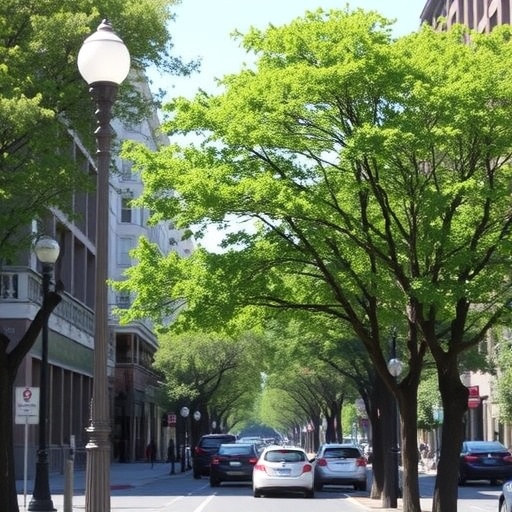Amidst the increasing global challenges posed by climate change and urbanization, researchers have turned their attention to the resilient nature of urban trees, particularly those exposed to harsh environmental stressors. A groundbreaking study from Italy illuminates the response of Pinus pinea, commonly known as the stone pine, to high temperatures compared to traditional pollutants. This research holds significant implications for urban forest management, as it underscores the vital role that these trees play in mitigating urban heat while simultaneously revealing their vulnerabilities in the face of climate action.
The study, led by Mondanelli et al., specifically evaluates the tree ring width and isotopic composition of Pinus pinea specimens collected from Florence and Pisa. These two cities provide an ideal backdrop for such an investigation, as they are characterized by distinct pollution profiles and temperature variances. By analyzing these environmental factors, researchers aim to discern the relative impacts of pollution and temperature on tree health and growth dynamics.
Tree rings serve as historical records of climatic conditions and environmental changes. Each ring provides insights into a year of growth, influenced by various factors, including water availability, nutrient supply, temperature, and atmospheric composition. In urban environments, where trees encounter heightened levels of air pollution, understanding the extent to which these stressors affect growth is crucial for urban planning and forestry practices.
The study’s findings reveal that Pinus pinea trees exposed to higher temperatures exhibit significantly altered growth patterns compared to their counterparts in less polluted areas. While it is widely accepted that air pollution can adversely affect tree health, the data suggests that in the context of urban heat, temperature stress may outweigh pollution effects. This differentiation highlights a critical pivot in understanding urban tree growth, where climate change predictions call for increasingly hotter summers.
Through isotopic analysis, the researchers delved deeper into the physiological responses of the trees. The isotopic ratios of carbon in the tree rings offered a window into photosynthetic efficiency and water use, leading to direct correlations between environmental conditions and tree metabolism. As urbanization continues to escalate, monitoring these parameters becomes even more essential in preserving and enhancing urban greenery.
Another vital aspect of the research is its exploration of how urban trees can adapt to rising temperatures. Notably, the study illustrates that Pinus pinea is capable of physiological adjustments that enable it to survive and even thrive despite the stresses of a polluted urban environment. This adaptability positions the species as a potential ally in combating urban heat islands, which pose serious risks to both human health and biodiversity.
As the researchers analyzed data from multiple locations within the two cities, the variations in tree growth rates became evident. Trees in Florence, characterized by higher pollution levels, showed resilience but at a compromised growth rate compared to those in less polluted Pisa. Such disparities prompt questions about how urban forestry can strategically prioritize tree species based on expected climate conditions and pollution levels.
Moreover, the implications of this research extend beyond Pinus pinea. The identification of climate resilience traits can inform the selection of suitable species for planting in urban areas facing similar challenges. Urban planners might use these insights to create tree planting policies that align with climate adaptation strategies, ultimately fostering healthier urban ecosystems.
In addition to the ecological considerations, the findings also resonate with public health implications. Urban green spaces offer cooling effects that can reduce health risks associated with heatwaves, a growing concern in the face of climate change. Thus, the vitality of urban trees not only nurtures biodiversity but also directly contributes to human well-being by providing essential shade and improving air quality.
This research contributes to a pivotal understanding of urban ecology, shedding light on how trees respond to compounded stressors in cities. The study encourages a reassessment of urban forest management practices, advocating for adaptive strategies that prioritize the resilience of urban trees. It urges stakeholders to recognize the necessity of integrating green infrastructure within urban planning frameworks to enhance climate resilience and ensure the sustainability of urban ecosystems.
In conclusion, the innovative research conducted by Mondanelli et al. serves as both a warning and a guidepost for future urban tree management. As cities confront the dual crises of pollution and climate change, understanding the interplay between these factors and their effects on vital urban trees will be essential. The findings regarding Pinus pinea stand not merely as data points but as a clarion call for action toward robust urban forestry policies that withstand the test of climate adversity.
The intricate balance between temperature impact and pollution effects on urban trees documented in this study marks a significant advance in ecological research. As the world grapples with escalating temperatures and urban pollution, the need for more resilient urban forests becomes paramount.
Through continued studies and ongoing commitment to urban ecology, society can better prepare for the challenges ahead by fostering environments where both people and nature flourish. The evidence from Pinus pinea in Florence and Pisa illustrates that while challenges exist, there are also pathways to resilience, ensuring that urban trees remain a fundamental part of our cities.
The dialogue initiated by this research will propel urban foresters, policymakers, and community leaders to rethink how cities can be designed, not just as concrete jungles, but as thriving ecosystems where nature and urban living coalesce harmoniously.
Subject of Research: Urban tree growth response to temperature and pollution effects in Pinus pinea.
Article Title: Tree ring width and isotope ratios show that high temperatures exceed pollution effects on urban trees: evidence in Pinus pinea in Firenze and Pisa, Central Italy.
Article References: Mondanelli, L., Cherubini, P., Salbitano, F. et al. Tree ring width and isotope ratios show that high temperatures exceed pollution effects on urban trees: evidence in Pinus pinea in Firenze and Pisa, Central Italy. Environ Sci Pollut Res (2025). https://doi.org/10.1007/s11356-025-37218-1
Image Credits: AI Generated
DOI: https://doi.org/10.1007/s11356-025-37218-1
Keywords: Urban trees, climate change, pollution, Pinus pinea, tree growth, tree rings, isotopes, urban forestry, ecological resilience.




